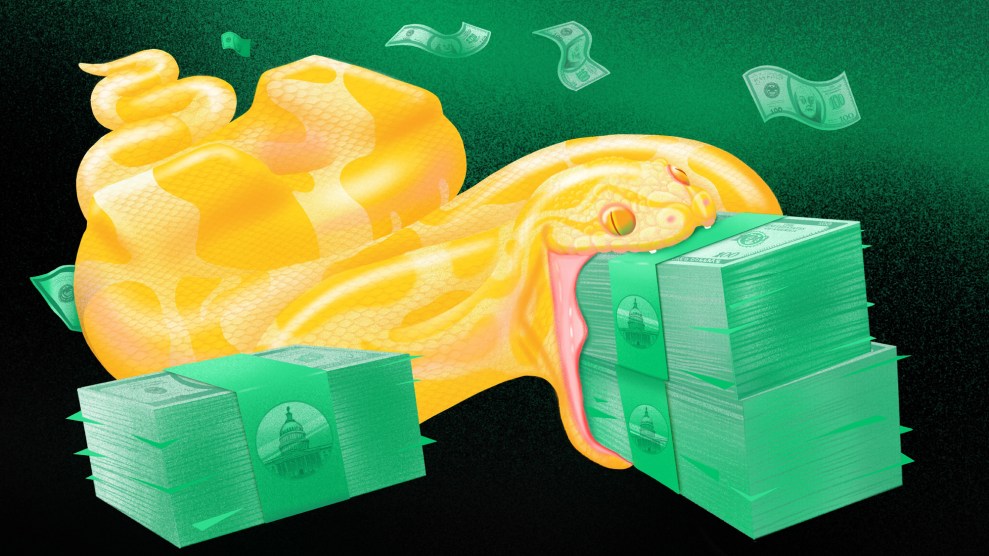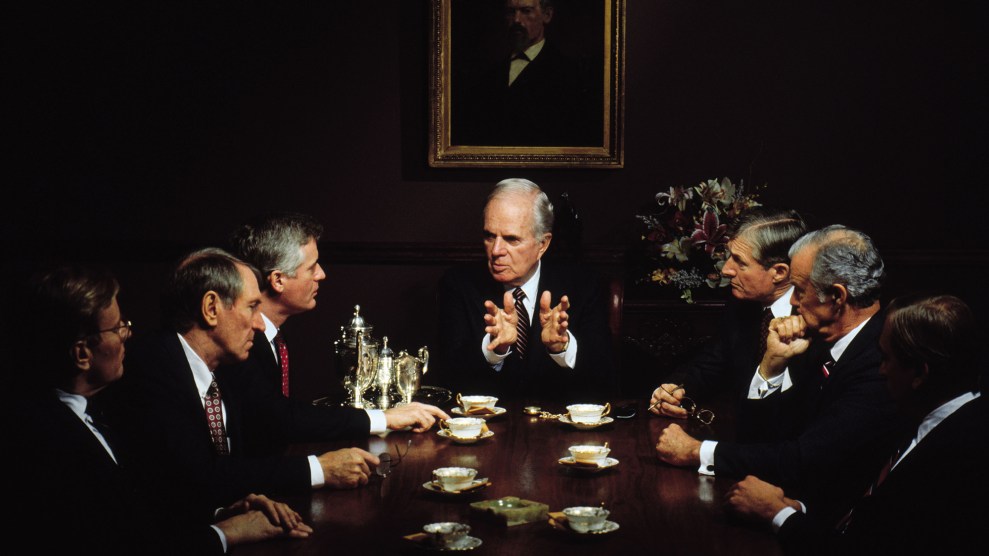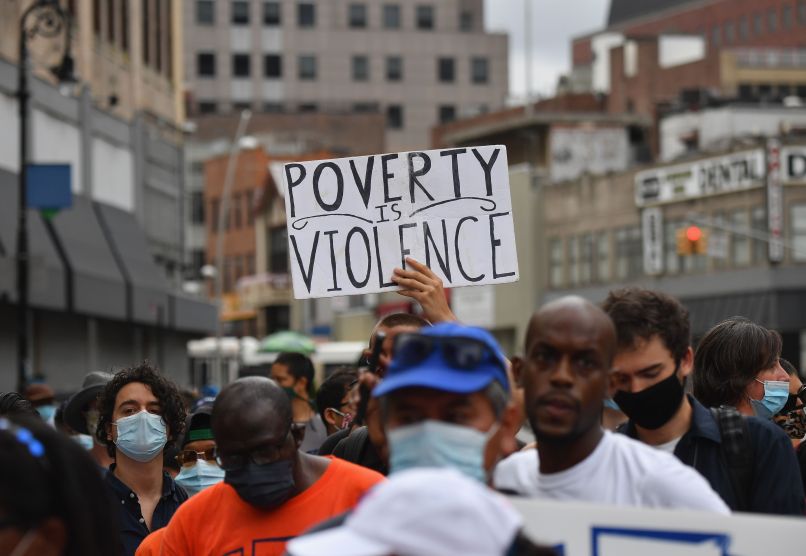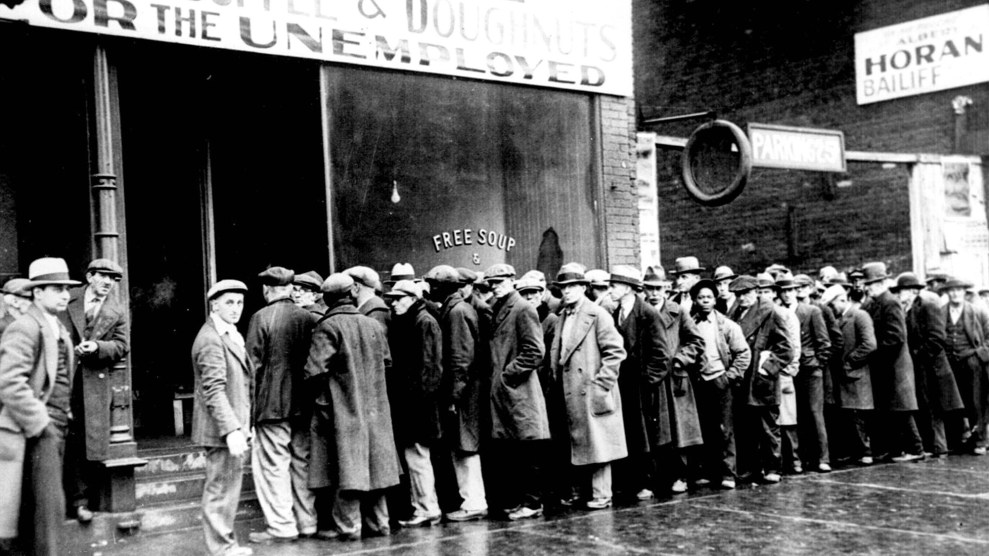
Unemployed men line up for free food in Chicago, circa 1931.Photo12/Universal Images Group/Getty
Matthew Desmond, the 43-year-old Princeton sociologist whose last book, Evicted, won the 2017 Pulitzer Prize for general nonfiction, is back with another one, Poverty, by America, that’s bound to generate fruitful debate—and perhaps even inspire some of us to get off our asses and tackle this scourge once and for all.
There are hundreds of nonfiction and fiction books that show us what poverty looks like—Charles Dickens jumps to mind, as does Barbara Kingsolver’s excellent Dickens adaptation, Demon Copperhead. But Desmond, raised in Arizona with a taste of deprivation, instead chose to focus on the why: Why does poverty—especially deep poverty—a ghastly state of existence for 1 in 18 Americans—remain so stubbornly persistent in the richest nation on Earth?
In this enlightening book, Desmond examines the reasons Americans face destitution at such higher rates than, for example, our European friends. He calls not only upon policymakers, but all decent people of privilege to acknowledge our complicity in this national shame—indeed, to remake ourselves as poverty abolitionists. We have the resources to eliminate poverty, he says, and we know what it takes. And while those steps may be a tough sell in this bitter political environment, Desmond is refreshingly optimistic. After all, he says, “We’ve been here before.” Our conversation was edited for length and clarity.
How would you characterize your family’s socioeconomic situation growing up?
We experienced some of the hardships of poverty, like getting our gas shut off—and our home got foreclosed. But it wasn’t a level of poverty anywhere close to what I saw in Milwaukee, or what I experienced researching the last book. We weren’t well off or even middle class, but we also weren’t anything like that desperate poverty.
A lot of kids are fascinated by wealth. You were fascinated by poverty as a young man. What drew your interest?
I was just confused by all this inequality I was seeing all around me and in college. I was confused that the story of America that I heard growing up in my church and my Boy Scout troop was not the America that I was seeing or learning about in class. And I think that confusion and moral unsettling led me to dig deeper.
The federal poverty line is $30,000 for a family of four. Deep poverty is half of that. What is that like?
It’s extreme scarcity and deprivation. Often that means all of these problems collapsing in on themselves: It’s sickness and death and chronic pain. It’s often exposure to crime. It’s the humiliation of eviction and debt collection and the degradation rituals of the welfare office, and on and on. I wish poverty was just an income level. It would be so much easier to address.
And as a lot of antipoverty movements have been saying for years, the poverty line is just the beginning. They are really forcing us to see all the economic hardship above the poverty line, like what does it mean to live on $55,000 in Berkeley and try to raise two kids? That’s not officially poor, but what else do you call it? Folks like Reverend Barber of the Poor People’s Campaign often talk about the one-third of Americans who live with enormous economic insecurity.
Right. You have a moving section early in the book where you write that poverty is pain, trauma, instability, shame, loss of liberty, diminished personhood—it’s really dismal for anyone. Yet it’s different if you’re white vs Black or Latino, and I presume Indigenous. How do those experiences differ?
There’s no neighborhood of concentrated white disadvantage that mirrors the neighborhoods of concentrated Black disadvantage, and by that I just mean the number of poor people living right next to each other that we see in cities like Milwaukee or Chicago or Cleveland. Because of our legacy of racial segregation and systematically dispossessing people of color from the land, they have a completely different poverty experience. And anti-Black labor market discrimination today is just as bad as it was 30 years ago, according to a meta-study published in the Proceedings of the National Academy of Sciences—30 years and no progress! So racial privileges extend below the poverty line and racial disadvantages compound the hardships of poverty in really meaningful ways.
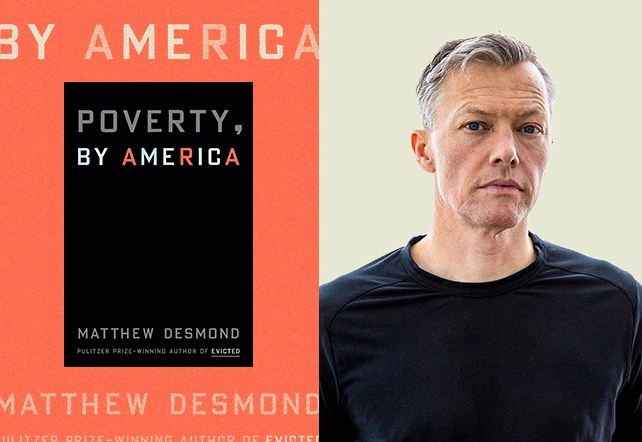
Matthew Desmond.
Photo by Barron Bixler
How has the experience of poverty changed significantly since the government began tracking it in the mid-1960s?
One big difference relates to how incarceration and caging has come to define a part of American life for a giant sector of very poor people—especially poor Black and Latinx people. There also has been this rise of technology a lot of us benefit from. In the book, I talk about how there was a time where you used to have to be rich to afford a cellphone. Now most of us have them. But someone wrote me the other day from New Zealand with this great line: “The things we don’t need have become cheaper and the things we need have become more expensive.” And they are right: Rents have doubled over the last 20 years; the cost of fuel and utilities has increased 115 percent.
And then people point to the cellphone and say, “Hey, that homeless guy doesn’t have it so bad.”
Right. But you can’t trade a cellphone for health insurance or adequate childcare. You can’t eat a flatscreen TV. So I think that’s a really shallow way of viewing the realities of poverty.
One thing that struck me while researching my own book, which looks at how we perpetuate and protect wealth in America, is that 40 percent of US households have zero wealth on average—literally nothing of value. And almost one in four has negative wealth; they’re in debt. Their only fallback is public assistance. But you write that today’s welfare policies are hostile to families.
You hear from certain politicians, well, if people just got married this would solve the poverty problem. But then look at the way we design these programs: If I am a poor working person and so is my partner and we get married, we often will get less Earned Income Tax Credit. If we receive food stamps, those go down, too. I’m a single parent and the father or the mother of my child isn’t on my lease and I let them live with me, I risk eviction, and I could lose my housing assistance. This really seems antithetical to the message we get about marriage support. I don’t want to overemphasize this aspect, but I think it raises the question about why we’re designing these programs to be anti-family.
Why is indeed the big question here. Your book focuses on why poverty persists in America. What did you find were the most important factors?
In a nutshell, poverty persists because of a lot of us benefit. We allow it, we permit it, we like it. Poverty persists because of the unrelenting exploitation of the poor in the labor markets, housing markets and financial markets, and because we design a welfare state that does much more to subsidize affluence than alleviate poverty. And we continue to be segregationists. We continue to build walls around our affluent communities and exclude people from the opportunity within.
Regarding the exploitation of workers, one study you cite found that if our labor market were perfectly competitive, median incomes would be at least $10,000 higher, and maybe even tens of thousands more. How does corporate America interfere with the mobility prospects of low-wage workers in particular?
By diluting worker power. Our most equitable time in America was in the 1970s, when worker power was strongest. Inflation-adjusted real wages increased around 2 percent a year between World War II and 1979, and unions had a big role in that. But since 1979, real wages have increased by only 0.3 percent a year. Unions have lost a lot of power. And we’ve moved from a job market where the jobs used to come with decent wages, decent benefits, and clear room for advancement to one where wages are stagnant, benefits are iffy, and often you’re an independent contractor that doesn’t even work for the company you’re physically working in.
That’s what you called a “fissured workplace.” Say more about that.
That’s David Weil’s phrase. And what he means is, there are people that work for Google and Google signs their checks—they are software engineers or they’ve got the corner office. But there’s all sorts of people that also work at Google who are independent contractors and not entitled to all the benefits and advancements and advantages of an official Google employee. They do everything from subcontracting engineering tasks to cleaning the offices to being in the mailroom. These workers are in the manufacturing sector, they’re in universities, they’re in a lot of places. And this is just about power.
Some economists and politicians still claim that labor unions are a drag on the economy and that raising minimum wages kills jobs. You write that neither argument holds up to scrutiny.
In 1946, the economist George Stigler made this case that raising minimum wages would increase unemployment. But he did it without any data! When economists started looking at this empirically in the ’90s, they found that Stigler was wrong. And I think that most labor economists today would agree that the best research shows that increases in the minimum wage have negligible effects on job numbers. People aren’t paid so poorly because they have to be for their job to exist—they’re paid so poorly because some folks benefit from it.
As for the union question, the economy today is much less productive than it was when unions were at their peak. One book I quote, Radical Markets, had this line, “We were promised inequality in exchange for economic dynamism. We got inequality, now dynamism is declining.” That’s true. And there’s evidence now that unions increased productivity by doing things like decreasing staff turnover.
You write, as I did in my book, about how it’s actually more expensive in a sense to be poor than rich. In what ways did you find that to be the case?
Poor folks don’t have a lot of choice. They accept bad options because they’re the only options available. So, if you’re a low-income family, you’re usually shut out of homeownership and you’re often shut out of public housing or any kind of housing assistance. Your one option is to rent from a private landlord. For most poor families, that’s at least half of your income, much more expensive than if you owned. I write about a woman in Cleveland named Lakia Higbee who was paying $950 a month to rent a home there. If she bought that home under conventional mortgage standards, she would pay like $570, so that’s almost $4,500 more in her pocket every year. But renting is the only choice she has.
I think people with some privilege tend to think about poverty the way white people talk about racism. They’ll say, hey, I’m not a racist, and I had nothing to do with any of this stuff. And yet it’s indisputable that they’ve benefited from racist policies. With poverty, it’s clear how payday lenders and slum landlords and CEOs in labor-heavy industries benefit. What about people like you and me?
We benefit because we like cheap goods. And if we’re invested in the stock market, we like high returns. And often those cheap goods and high returns come in the form of human sacrifice—companies driving down labor costs. We also like the tax breaks that accrue to privileged Americans, like the mortgage-interest deduction and the 529 college-savings plans. If there wasn’t so much poverty and homelessness and eviction in the country, I would have a lot less problem with those kinds of advantages. But if you have a welfare state that does more to protect fortunes than it does to alleviate poverty, and then this constant refrain in our political discourse that we can’t afford to do more, we just have to say that is a blatant lie.
Right, and it’s also reductive to pretend everything is zero-sum. We can afford what we decide we can afford. I’ve actually been writing a bunch about federal subsidies for retirement savings, which are insanely expensive and very skewed in favor of the rich.
Yeah, exactly right. And I think it’s time that we have a reckoning with this. I’m very suspicious of absolving theories of poverty both from the left and from the right, stories that let us off the hook. And I don’t say this to induce guilt—I say this to induce action. I think there are completely sensible ways to have fair tax implementation and make deep differences.
A recent study showed that if the top 1 percent of earners just paid the taxes they owed, we would collect an additional $175 billion a year, which is almost enough to lift everyone out of poverty. Enough to double our investment in affordable housing or reestablish the child tax credit that did so much to cut child poverty during Covid. Finding the resources and policies isn’t hard. It’s the political will that’s hard. And that’s why the book is trying to get people to take this personally, to say, “You know what? I am connected to this problem so I’m connected the solution as well.”
I think a lot of well-intentioned people recognize the problem but maybe view it as inevitable or they feel powerless to address it. Can you address this mindset as opposed to what you’re advocating, which is for people to be “poverty abolitionists?”
Yeah, I do think we’ve settled into this idea that this is the best we can do. And it’s fascinating to read the early capitalists who were so excited about the poverty-reducing power of capitalism! John Stuart Mill was like, Look, if poverty persists in a capitalist society, I’d be a Communist. And we’ve lost that drive to be a nation truly obsessed with economic opportunity and freedom. I think we shouldn’t settle. The right poverty rate in a country that’s rich is zero. We have the resources to do it.
So what can individuals do?
We can turn away from segregation and evaluate the walls that we’ve built around our affluence, and work to tear them down. That seems like a policy solution, and it is, but it also requires us to act. Pushing for inclusive communities means that we show up at that Tuesday night zoning board meeting, and we stand up and say, “No, I want this!” Have you been to a zoning board meeting?
I try to avoid them.
Right. They’re intense. These people are doing so much hard work defending segregation—and they’re using the same excuses our fathers and our grandfathers did. We just have to do the hard work of tearing down that wall.
Right. It’s just hard to feel optimistic when the Republicans are actively waging war on “woke capitalism” and insisting on shareholder supremacy.
Yeah, but we’ve been here before. In the ’60s, Southern Democrats aligned with Republicans to block civil rights legislation, but the civil rights and labor movements just kept pushing. And they won a giant section of the public over.
If we want to be serious about freedom and opportunity, we have to be serious about ending poverty. This would be obviously life-altering and deeply meaningful to millions of Americans who struggle to afford basic needs. But it also would give more meaning and happiness and fulfillment to Americans that are quite secure in their money but still feel scared and worry about how far their kids might fall.
An America without poverty is not free of problems—or inequality, even. But I do think it’s an America more of us would want to live in than the one we’ve inherited.

